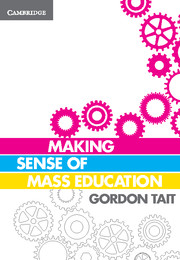Book contents
- Frontmatter
- Contents
- Acknowledgements
- INTRODUCTION
- PART 1 RE-ASSESSING THE THREE PILLARS: MODERN AND POSTMODERN SOCIOLOGIES OF EDUCATION
- PART 2 THE FOUNDATIONS OF AN ALTERNATIVE APPROACH: EDUCATION AND GOVERNANCE
- CHAPTER 4 GOVERNANCE
- CHAPTER 5 SUBJECTIVITY
- CHAPTER 6 PRE-ADULTHOOD
- PART 3 CULTURAL CONTEXTS OF CONTEMPORARY EDUCATION
- PART 4 PHILOSOPHY AND MASS EDUCATION
- CONCLUSION
- References
- Index
CHAPTER 5 - SUBJECTIVITY
from PART 2 - THE FOUNDATIONS OF AN ALTERNATIVE APPROACH: EDUCATION AND GOVERNANCE
- Frontmatter
- Contents
- Acknowledgements
- INTRODUCTION
- PART 1 RE-ASSESSING THE THREE PILLARS: MODERN AND POSTMODERN SOCIOLOGIES OF EDUCATION
- PART 2 THE FOUNDATIONS OF AN ALTERNATIVE APPROACH: EDUCATION AND GOVERNANCE
- CHAPTER 4 GOVERNANCE
- CHAPTER 5 SUBJECTIVITY
- CHAPTER 6 PRE-ADULTHOOD
- PART 3 CULTURAL CONTEXTS OF CONTEMPORARY EDUCATION
- PART 4 PHILOSOPHY AND MASS EDUCATION
- CONCLUSION
- References
- Index
Summary
This chapter argues that our subjective experiences – how we experience the world, and understand ourselves within it – are just as closely governed as our objective conduct (discussed in the last chapter). Whether they realise it or not, contemporary teachers are expected to play a significant role in this form of regulation. After all, teachers are now not simply responsible for transmitting a given curriculum and keeping children in line, they are de facto psychologists, responsible for the mental health, regulation and development of their pupils.
Myth #1 The sole purpose of psychology is to understand the nature of the human mind
All societies have mentally ill people. Psychology began by explaining the workings of the normal human mind, and why some people were different. From there, the discipline eventually came to be used in schools.
‘Mental illness’ is a relatively new way of understanding forms of conduct associated with ‘unreason’, and regardless of its function today, psychology originated not as an attempt to know the normal human mind, but rather as a system for finding and managing those unlikely to fit into the new, mass school.
Myth #2 My conduct may be governed, but my mind remains free
Disciplinary societies like the school certainly regulate our conduct, but they can't control our minds. That is, the power of the school may cover our bodies, but it doesn't extend inside our heads.
Just as contemporary forms of governance have rendered our objective conduct amenable to regulation and normalisation, so too has the discipline of psychology made our subjective lives – our desires, motivations, intellectual capacities, perceptions, systems of thought – open to rigorously structured intervention and regulation.
- Type
- Chapter
- Information
- Making Sense of Mass Education , pp. 99 - 119Publisher: Cambridge University PressPrint publication year: 2012



